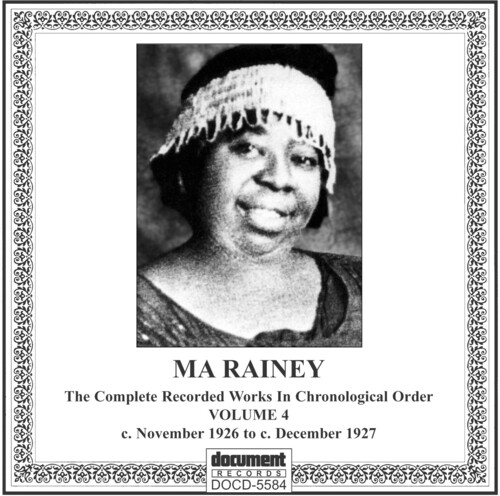Show results for
Explore
In Stock
Artists
Actors
Authors
Format
Theme
Category
Genre
Rated
Label
Specialty
Decades
Size
Color
Deals
- 4K Ultra HD Sale
- Action Sale
- Alternative Rock Sale
- Anime sale
- Award Winners Sale
- Bear Family Sale
- Blu ray Sale
- Blu ray Special Editions
- Blues on Sale
- British Sale
- Classical Music Sale
- Comedy Music Sale
- Comedy Sale
- Country Sale
- Criterion Sale
- Electronic Music sale
- Hard Rock and Metal Sale
- Horror Sci fi Sale
- Kids and Family Sale
- Metal Sale
- Music Video Sale
- Musicals on Sale
- Mystery Sale
- Naxos Label Sale
- Page to Screen Sale
- Rap and Hip Hop Sale
- Reggae Sale
- Rock
- Rock and Pop Sale
- Rock Legends
- Soul Music Sale
- TV Sale
- Vinyl on Sale
- War Films and Westerns on Sale

Vol. 4-(Nov 1926-Dec 1927)
- Artist: Ma Rainey
- Format: CD
- Release Date: 1/2/1998

Vol. 4-(Nov 1926-Dec 1927)
- Artist: Ma Rainey
- Format: CD
- Release Date: 1/2/1998
- Artist: Ma Rainey
- Label: Document
- UPC: 714298558425
- Item #: 2399610X
- Genre: Blues Traditional
- Release Date: 1/2/1998
- This product is a special order

Product Notes
This is the fourth of five volumes dedicated to the complete recorded works of Gertrude Ma Rainey, released during the 1990s by Document. Mapping her recording activities from November 1926 to December 1927 with 22 single take titles, it opens with "Morning Hour Blues," a straightforward number rendered somewhat hypnotic by the combination of Jimmy Blythe's piano, Blind Blake's guitar, and the delicately handled xylophone of Jimmy Bertrand. Ma Rainey's accompanists on this disc also include cornetist B.T. Wingfield, trumpeter Shirley Clay, trombonists Kid Ory and Albert Wynn, clarinettists Johnny Dodds and Artie Starks, violinist Leroy Pickett, and pianist Claude Hopkins. Like every volume in the series, this is a potent storehouse of undiluted early blues, strongly anchored and embellished by jazz musicians from New Orleans, Chicago, and New York. "Big Boy Blues" has a delightful solo by an unidentified tuba player who generates basslines similar to what Coleman Hawkins came up with using a bass saxophone in December of 1925 (see Vol. 3). Much of Rainey's repertoire consisted of songs that dramatized the heart-breaking ups and downs of interpersonal relationships. Near the beginning of "Gone Daddy Blues" Rainey engages in a bit of theatrical patter with an unidentified man who reacts poorly when reminded that she is his wife. "Wife?" he says, "ain't that awful!" Rainey's music was always about real life as she saw it. She sang about battling depression, drinking to excess, and dodging bad prohibition liquor. On a regular basis, her road show background would manifest itself in burlesque entertainment like the famous "Ma Rainey's Black Bottom," a rare example of double entendre lyrics, to which she almost never resorted. The title refers to the Black Bottom, a popular dance rivalled only by the Charleston in it's day. The original flipside was a boisterous version of Kerry Mills' "Georgia Cake Walk," with lots of spoken commentary throughout. Most Rainey performances, however, are slow paced diary entries packed with gut-level honesty. Some aspects of womanhood expressed by Ma Rainey are as timeless as can be. In her "New Bo-Weevil Blues," for example, she goes downtown and buys a new hat as a remedy for the blues, explaining to the world in no uncertain terms: "I'm tired of sleeping by myself.
Credits
-
Artist(s)Ma Rainey

